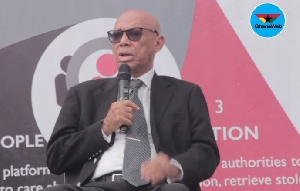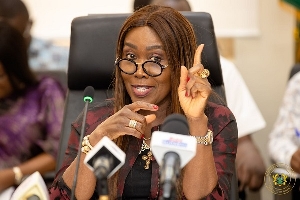General News of Friday, 8 December 2017
Source: starrfmonline.com
Let’s fight corruption by actions – Emile Short
A former Commissioner of CHRAJ Emile Short has bemoaned the slow pace at which corruption is being tackled in the Ghanaian society.
He is rallying all hands to be on deck in the fight against corruption.
“Our advocacy is to demonstrate to the general public, the significant impact of corruption on national development and I am glad that this is what this event is demonstrating. This is what is going to generate the kind of support and commitment we need from everybody, including the general public in the fight against corruption,” Justice Short stated at the maiden Corruption Watch Pop-Up Event.
He added: “This is the objective of Corruption Watch; to draw attention persistently, to the various acts of corruption that we continuously talk about in the media, and yet, nothing is done.
“There is too much talk and very little action so we really need to make sure that those who have the responsibility of investigating and prosecuting acts of corruption sit up and save the nation from the millions of dollars of cedis that we are losing.
“So I cannot overemphasize the importance of Corruption Watch and this particular event which is dramatizing the impact that a few people can make on the lives of Ghanaians by stealing funds which are needed for social and economic services.”
As part of activities marking the 2017 Anti-Corruption Week, Corruption Watch Ghana organized its maiden anti-corruption pop-up event at the car park of Wisconsin International University College, North Legon.
Among other things, the event sought to create public awareness on the negative impact of corruption, educate people on the role of citizens in the anti-corruption fight, awaken the consciousness of Ghanaians to take a stand against corruption and also to trigger a national debate on corruption. It also formed part of the project’s mobilization strategies to reduce the high levels of public corruption with the support of the public.
As part of activities to communicate the project’s objectives to passersby and the general public, student volunteers from Wisconsin University and the Ghana Institute of Journalism (GIJ) stood by the roadside holding placards with inscriptions communicating the negative effects of corruption and the need for Ghanaians to get involved.
There was also a display of Ghs 350 million stuffed in over 200 jute bags. This was to represent the Ghs 350 million which was lost when some 12 persons allegedly set fire to the Central Medical Stores to cover up a $3 million procurement fraud.
Some of the Corruption Watch Ambassadors include Justice Emile Short, Professor Audrey Gadzekpo, Shamima Ishmael and Nana Awere Damoah.
On her part, Prof Gadzekpo said: “It’s not enough to have words and promises that something will be done. It’s not enough to give speeches that corruption is unacceptable. It is important to demonstrate why it is unacceptable.
“This is a very good intervention to let people understand what corruption actually translates into and its impact on individual lives, on development, on what we could have achieved with the kind of monies which have dissipated because of corruption.”











